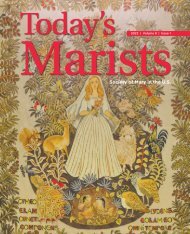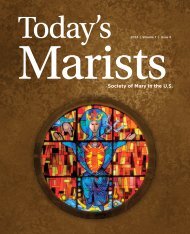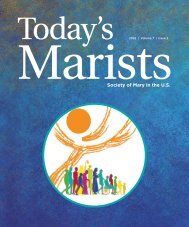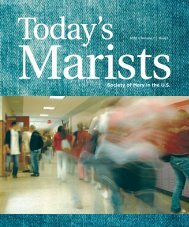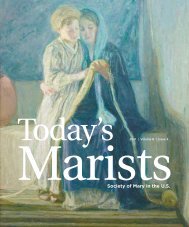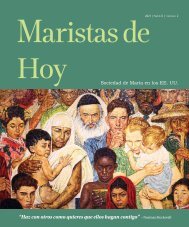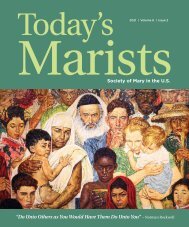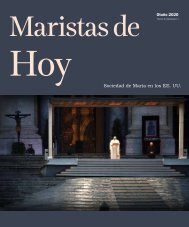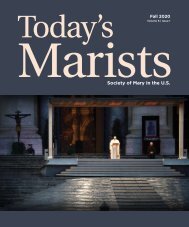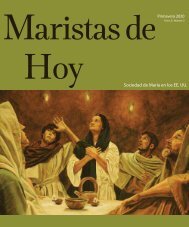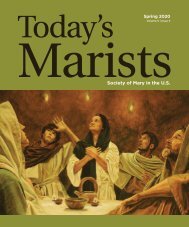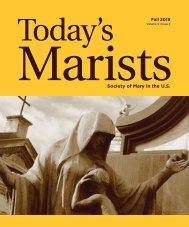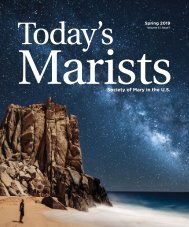Today's Marists 2024 Volume 8, Issue 2
You also want an ePaper? Increase the reach of your titles
YUMPU automatically turns print PDFs into web optimized ePapers that Google loves.
stereotypes and deepen mutual respect. By engaging in<br />
open and respectful dialogue, individuals can learn about<br />
the rich diversity within each tradition and recognize the<br />
shared values that underpin their respective beliefs.<br />
Moreover, interfaith dialogue serves as a catalyst for<br />
building bridges of understanding and solidarity across<br />
religious divides. In a world plagued by conflicts fueled<br />
by religious extremism and sectarianism, fostering<br />
dialogue and cooperation among Jews, Christians and<br />
Muslims is crucial for promoting peace and reconciliation.<br />
By acknowledging and embracing the commonalities<br />
between our faiths, we can work together to address<br />
pressing global issues, such as the contemporary surge<br />
in antisemitism, poverty, inequality and environmental<br />
degradation, from a shared ethical framework.<br />
Additionally, interfaith dialogue offers an opportunity for<br />
personal and spiritual growth, as individuals engage in<br />
self-reflection and deepen their understanding of their<br />
own faith in relation to others. By encountering different<br />
perspectives and engaging in meaningful conversations<br />
with people of diverse backgrounds, individuals can<br />
broaden their horizons, cultivate empathy and develop<br />
a more nuanced understanding of complex theological<br />
and ethical questions. This process of introspection and<br />
learning not only enriches one’s own spiritual journey but<br />
also fosters a deeper sense of interconnectedness with the<br />
broader human family.<br />
Furthermore, interfaith dialogue plays a crucial role<br />
in promoting social cohesion and fostering inclusive<br />
communities. By coming together to address common<br />
concerns and work towards shared goals, members of<br />
different faith communities can build relationships based<br />
on trust, cooperation and mutual respect. This sense of<br />
solidarity serves as a powerful antidote to the forces of<br />
division and polarization that threaten to tear societies<br />
apart, offering a vision of unity in diversity that celebrates<br />
the dignity and worth of every individual.<br />
In the context of the Israeli-Palestinian conflict, interfaith<br />
dialogue takes on added significance as a means of<br />
promoting reconciliation and understanding between<br />
two peoples who share a deeply contested land. By<br />
bringing together Jewish, Christian and Muslim voices in<br />
constructive dialogue, individuals can contribute to the<br />
ongoing efforts to achieve a just and lasting peace based<br />
on mutual recognition and respect for the rights and<br />
aspirations of all parties involved.<br />
In conclusion, Jewish, Christian and Muslim dialogue is of<br />
paramount importance in today’s world, where the forces<br />
of division and hatred threaten to tear communities apart.<br />
By fostering mutual understanding, promoting peace and<br />
reconciliation and building inclusive communities based<br />
on shared values, interfaith dialogue offers a powerful<br />
antidote to the prejudices and misconceptions that too<br />
often fuel conflict and violence. As we strive to build a<br />
more just and harmonious world, let us embrace the<br />
transformative power of dialogue to bridge divides, heal<br />
wounds and create a brighter future for all.<br />
One Hundred, continued from page 9<br />
Palm Sunday procession in the village of Tepezintla<br />
pay for eight, nine, ten hours of work in the sunshine or in the rain in<br />
a mountainous and ungrateful land, that does not provide enough to<br />
survive from one year to the next. They give it gratefully because “I said<br />
a little Mass!”<br />
On the last day of the mission I was sick and could hardly stand. The<br />
church was packed with dozens of people waiting in the sacristy.<br />
Gathering the sheets of paper took almost an hour – there were more<br />
than a hundred of them! Thea prayers of the faithful seemed to last<br />
forever. I struggled to make it, but the people looked at me with big sad<br />
eyes, begging with their eyes, attentive to hear their names, the name<br />
that Totatzin (God) was hearing too! Why? Well, if He does not listen to<br />
them...? The little father’s voice carefully pronounced each name. I tried<br />
to do it with care, with love, as if they were my own loved ones. I felt that<br />
in some new, unexpected way they already were. ....<br />
A few hours later the parish priest came to see me off. I gave him all the<br />
money from the intentions: “This is for you, Father, it’s money from the<br />
parish”.<br />
“No, no!” he says, “It’s yours, you have earned it, you celebrated the<br />
Masses.”<br />
“Father, I can’t take this money.” I protest, “To spend it on what? My<br />
candy bars, my soft drinks? This money is sacred. It’s worth months of<br />
work. How can I take it with me? It must stay here, with you, with these<br />
people. And thank you for helping me discover this sacred world of my<br />
indigenous brothers and sisters that I have totally ignored for more than<br />
thirty-five years.”<br />
I took the bus back to my bourgeois life, my comforts, my comfort zone<br />
as a “person of reason”, a white city folk. While I only spent a few days in<br />
the Sierra Norte of the state of Puebla, I do not take with me a memory,<br />
I take with me a wound. A wound that will accompany me until the last<br />
day of my life. A wound that has not healed, or perhaps a scar that still<br />
bleeds; that of the poverty of my brothers and sisters, the hunger and<br />
desperation drowned with so much “win”, the homemade fermented<br />
alcohol made in these mountains. The wound of not having been able<br />
to do more. I try to remember that I am a priest, not a social worker<br />
or a union leader, that my mission is my mission, and everyone has a<br />
unique role to play. My role now is to help everyone discover God’s love,<br />
their response, their vocation, their responsibility. If we want things to<br />
change, we must pay the price.<br />
And despite everything, despite the pain that accompanies me, I am<br />
also accompanied by the words that I learned and said so many times in<br />
Nawatl: “Totazin Tio Xihua miyac!” (God loves you very much!)<br />
<strong>Volume</strong> 8 | <strong>Issue</strong> 2 11



